7 books about Hugo, Victor
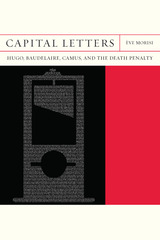
Capital Letters
Hugo, Baudelaire, Camus, and the Death Penalty
Ève Morisi
Northwestern University Press, 2020
Capital Letters sheds new light on how literature has dealt with society’s most violent legal institution, the death penalty. It investigates this question through the works of three major French authors with markedly distinct political convictions and literary styles: Victor Hugo, Charles Baudelaire, and Albert Camus. Working at the intersection of poetics, ethics, and law, Ève Morisi uncovers an unexpected transhistorical dialogue on both the modern death penalty and the ends and means of literature after the French Revolution. Through close textual analysis, careful contextualization, and the critique of violence forged by Giorgio Agamben, Michel Foucault, and René Girard, Morisi reveals that, despite their differences, Hugo, Baudelaire, and Camus converged in questioning France’s humanitarian redefinition of capital punishment dating from the late eighteenth century. Conversely, capital justice led all three writers to interrogate the functions, tools, and limits of their art. Capital Letters shows that the key modern debate on the political and moral responsibility, or autonomy, of literature crystallizes around the death penalty in works whose form disturbs the commonly accepted divide between aestheticism and engagement.
[more]
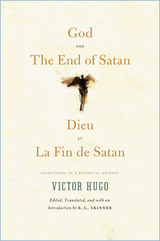
God and The End of Satan / Dieu and La Fin de Satan
Selections: In a Bilingual Edition
Victor Hugo
Swan Isle Press, 2014
While living in exile with his family on the Channel Islands off the coast of Normandy, Victor Hugo wrote some of his greatest poetry and prose, including Les Misérables and two epic poems: Dieu and La Fin de Satan. Dieu pictures the imaginary search for God by a nameless protagonist, who must face the possibility of failure in this quest. La Fin de Satan, an indictment of prison, war, and capital punishment, depicts an attempt at reconciliation between good and evil.
This book brings together abbreviated editions of these two book-length poems—unfinished and unpublished at the time of the author’s death—comprised of selections that capture their visionary and mystical essence. The poems are accompanied by an introduction framing them within the author’s experience as an exile and tracing their publication history.
Victor Hugo is one of the most important figures in the history of French literature, and this beautifully rendered translation brings two of his lesser-known works deservedly to the forefront.
This book brings together abbreviated editions of these two book-length poems—unfinished and unpublished at the time of the author’s death—comprised of selections that capture their visionary and mystical essence. The poems are accompanied by an introduction framing them within the author’s experience as an exile and tracing their publication history.
Victor Hugo is one of the most important figures in the history of French literature, and this beautifully rendered translation brings two of his lesser-known works deservedly to the forefront.
[more]
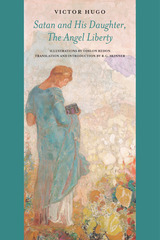
Satan and His Daughter, the Angel Liberty
Selected Verses
Victor Hugo
Swan Isle Press, 2018
Victor Hugo spent years in political exile off the coast of Normandy. While there, he produced his masterpiece, Les Misérables—but that wasn’t all: he also wrote a book-length poem, La Fin de Satan, left unfinished and not published until after his death.
Satan and his Daughter, the Angel Liberty, drawn from this larger poem, tells the story of Satan and his daughter, the angel created by God from a feather left behind following his banishment. Hugo details Satan’s fall, and through a despairing soliloquy, reveals him intent on revenge, yet desiring God’s forgiveness. The angel Liberty, meanwhile, is presented by Hugo as the embodiment of good, working to convince her father to return to Heaven.
This new translation by Richard Skinner presents Hugo’s verse in a unique prose approach to the poet’s poignant work, and is accompanied by the Symbolist artist Odilon Redon’s haunting illustrations. No adventurous reader will want to miss this beautiful mingling of the epic and familial, religious and political.
Satan and his Daughter, the Angel Liberty, drawn from this larger poem, tells the story of Satan and his daughter, the angel created by God from a feather left behind following his banishment. Hugo details Satan’s fall, and through a despairing soliloquy, reveals him intent on revenge, yet desiring God’s forgiveness. The angel Liberty, meanwhile, is presented by Hugo as the embodiment of good, working to convince her father to return to Heaven.
This new translation by Richard Skinner presents Hugo’s verse in a unique prose approach to the poet’s poignant work, and is accompanied by the Symbolist artist Odilon Redon’s haunting illustrations. No adventurous reader will want to miss this beautiful mingling of the epic and familial, religious and political.
[more]
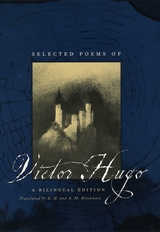
Selected Poems of Victor Hugo
A Bilingual Edition
Victor Hugo
University of Chicago Press, 2001
Although best known as the author of Notre Dame de Paris and Les Misérables, Victor Hugo was primarily a poet—one of the most important and prolific in French history. Despite his renown, however, there are few comprehensive collections of his verse available and even fewer translated editions.
Translators E. H. and A. M. Blackmore have collected Victor Hugo's essential verse into a single, bilingual volume that showcases all the facets of Hugo's oeuvre, including intimate love poems, satires against the political establishment, serene meditations, religious verse, and narrative poems illustrating his mastery of the art of storytelling and his abiding concern for the social issues of his time. More than half of this volume's eight thousand lines of verse appear here for the first time in English, providing readers with a new perspective on each of the fascinating periods of Hugo's career and aspects of his style. Introductions to each section guide the reader through the stages of Hugo's writing, while notes on individual poems provide information not found in even the most detailed French-language editions.
Illustrated with Hugo's own paintings and drawings, this lucid translation—available on the eve of Hugo's bicentenary—pays homage to this towering figure of nineteenth-century literature by capturing the energy of his poetry, the drama and satirical force of his language, and the visionary beauty of his writing as a whole.
Translators E. H. and A. M. Blackmore have collected Victor Hugo's essential verse into a single, bilingual volume that showcases all the facets of Hugo's oeuvre, including intimate love poems, satires against the political establishment, serene meditations, religious verse, and narrative poems illustrating his mastery of the art of storytelling and his abiding concern for the social issues of his time. More than half of this volume's eight thousand lines of verse appear here for the first time in English, providing readers with a new perspective on each of the fascinating periods of Hugo's career and aspects of his style. Introductions to each section guide the reader through the stages of Hugo's writing, while notes on individual poems provide information not found in even the most detailed French-language editions.
Illustrated with Hugo's own paintings and drawings, this lucid translation—available on the eve of Hugo's bicentenary—pays homage to this towering figure of nineteenth-century literature by capturing the energy of his poetry, the drama and satirical force of his language, and the visionary beauty of his writing as a whole.
[more]
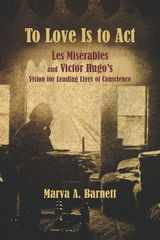
To Love Is to Act
Les Misérables and Victor Hugo’s Vision for Leading Lives of Conscience
Marva A. Barnett
Swan Isle Press, 2019
“To love is to act”— “Aimer, c’est agir.” These words, which Victor Hugo wrote three days before he died, epitomize his life’s philosophy. His love of freedom, democracy, and all people—especially the poor and wretched—drove him not only to write his epic Les Misérables but also to follow his conscience. We have much to learn from Hugo, who battled for justice, lobbied against slavery and the death penalty, and fought for the rights of women and children. In a series of essays that interweave Hugo’s life with Les Misérables and point to the novel’s contemporary relevance, To Love Is to Act explores how Hugo reveals his guiding principles for life, including his belief in the redemptive power of love and forgiveness. Enriching the book are insights from artists who captured the novel’s heart in the famed musical, Les Mis creators Alain Boublil and Claude-Michel Schönberg, producer of the musical Les Misérables Cameron Mackintosh, film director Tom Hooper, and award-winning actors who have portrayed Jean Valjean: Colm Wilkinson and Hugh Jackman.
[more]
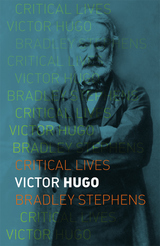
Victor Hugo
Bradley Stephens
Reaktion Books, 2019
Victor Hugo is an icon of French culture. He achieved immense success as a poet, dramatist, and novelist, and he was also elected to both houses of the French Parliament. Leading the Romantic campaign against artistic tradition and defying the Second Empire in exile, he became synonymous with the progressive ideals of the French Revolution. His state funeral in Paris made headlines across the world, and his breadth of appeal remains evident today, not least thanks to the popularity of his bestseller, Les Misérables, and its myriad theatrical and cinematic incarnations.
This biography, the first in English for more than twenty years, provides a concise but comprehensive exploration of Hugo’s monumental body of work within the context of his dramatic life. Hugo wrestled with family tragedy and personal misgivings while being pulled into the turmoil of the nineteenth century, from the fall of Napoleon’s Empire to the rise of France’s Third Republic. Throughout these twists of fate, he sensed a natural order of collapse and renewal. This unending cycle of creation shaped his ideas about freedom and roused his imagination, which he channeled into his prolific writing and other outlets like drawing. As Bradley Stephens argues, such creative intellectual vigor suggests that Hugo was too restless to sit comfortably on the pedestal of literary greatness; Hugo’s was a mind as revolutionary as the time in which he lived.
This biography, the first in English for more than twenty years, provides a concise but comprehensive exploration of Hugo’s monumental body of work within the context of his dramatic life. Hugo wrestled with family tragedy and personal misgivings while being pulled into the turmoil of the nineteenth century, from the fall of Napoleon’s Empire to the rise of France’s Third Republic. Throughout these twists of fate, he sensed a natural order of collapse and renewal. This unending cycle of creation shaped his ideas about freedom and roused his imagination, which he channeled into his prolific writing and other outlets like drawing. As Bradley Stephens argues, such creative intellectual vigor suggests that Hugo was too restless to sit comfortably on the pedestal of literary greatness; Hugo’s was a mind as revolutionary as the time in which he lived.
[more]
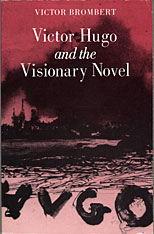
Victor Hugo and the Visionary Novel
Victor Brombert
Harvard University Press, 1984
Victor Brombert reassesses in a modern perspective the power and originality of Hugo’s work, and provides a new interpretation of Hugo’s narrative art as well as a synthesis of his poetic and moral vision. The twenty-eight drawings by Hugo reproduced in this book are further testimony to the visionary nature of Hugo’s imagination.
[more]
READERS
Browse our collection.
PUBLISHERS
See BiblioVault's publisher services.
STUDENT SERVICES
Files for college accessibility offices.
UChicago Accessibility Resources
home | accessibility | search | about | contact us
BiblioVault ® 2001 - 2024
The University of Chicago Press









